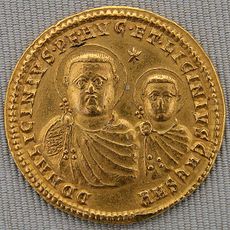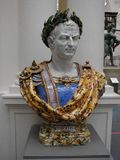Licinius
If even half of what is said about Roman Emperor Licinius (262-325) is true then this man is responsible for killing of great number of people. The list includes:-
- The wife and daughter of emperor Diocletian.
- The wife and children of emperor Maximinus Daia.
- The sons of emperors Severus and Galerius.
- Two co-emperors sacrificed to save his own skin.
- Cheating at Ancient Roman Lotto.
When he died, his rival (and brother-in-law) Constantine the Great had Licinius's name struck from all the historical records and additionally accused him of renewed paganism. For when in 313 the Christians were granted toleration, the edict was co-signed by Constantine and Licinius as respective emperors of the West and Eastern Roman empires. When he was dead, Licinius's role was erased. Existence revoked.
Romanian[edit | edit source]
Licinius was born in Dacia but had to move 10 years later when the Goths moved in and ejected him from home. The young Licinius and his family were forced to wander the Balkans until he grew up and joined the Roman army. This experience left Licinius a pathological fear of smudged make up and chrome bracelets. He joined the Roman legions and along the way, fell in with the roistering Galerius Gabberous (later emperor Galerius) and progressed up the ranks with his protector. Since Galerius was functionally illiterate, he relied on Licinius to read all bottles for their contents before emptying them. Perhaps to stay in with his benefactor, Galerius declined to get married and stayed out all nights with his drinking mate.
When Galerius became Caesar in 293, Licinius followed him on their military campaigns. More jobs followed and when Galerius became emperor in 306, Licinius organised the alcohol intake for everyone that same day. So far Licinius had shown no great skill at anything except buttering up Galerius. So there was general astonishment when Licinius was given a new job - emperor no less and an imperial equal of his old mate. Except of course, there were already three men out there claming the same title and the last one Galerius had promoted - Severus - had died recently in jail with his head kicked in.
Emperor of Where?[edit | edit source]
Licinius's jump to supreme power was one of the odd arrangements done at a big power meeting at Diocletian's retirement palace in Dalmatia. In theory as emperor, Licinius's job was to bust down to Caesar level his rival Constantine. However, as Maximian and his son Maxentius remained active as emperors, the slippery Licinius opted to stay put with his army and instead persuaded Galerius to give him a bit of his empire along the Danube-Rhine frontier to look after instead. Galerius agreed and then got bad stomach cramps whilst chasing Christians around the Roman Empire. His successor in the east Maximinus Daia had no special reason to like Licinius and showed more interest in becoming mates with Maxentius. Licinius now had to choose his allies. He went for Constantine and meet the man he was supposed to overthrow and execute. Can't have been an easy interview.
Alliance with Constantine and a Wife[edit | edit source]
Licinius was certainly no catch for anyone, judging by his surviving portraits. A jowly face and small eyes, Constantine would have looked at him and wondered if this man would be a reliable ally. However, the 'two Max' alliance was active and needed to be confronted. Constantine had an idea. He had a sister called Constantia who was annoying him and so suggested her as a 'marriage bridge'. Licinius said he 'needed to have a final fling at bachelorhood' and agreed in principle. He still hadn't made his mind up when Constantine went off to deal with Maxentius in Italy. Licinius agreed to move against Maximinus Daia but moved his legions very slowly, perhaps hedging his bets if Maxentius beat Constantine which would then allow Licinius to double back and conqueror Constantine's territories in Gaul and Britannia.
The severed head of Maxentius later, Licinius had got the proof of Constantine's victory. This seems to have sparked off Licinius's own interest in eliminating 'surplus imperial material'. It was during this time he appears to have killed Diocletian's wife Prisca and daughter Valeria - widow of emperor Galerius. In addition, he knocked off Galerius's son Candidianus and even Severianus, the son of the otherwise forgotten emperor Severus. Then it was off to Asia to find Maximinus, The latter fled and then committed suicide. Licinius then added his opponent's wife, daughter and son to the death tally. This 'bloody tidying up' was overlooked when in 313 he and Constantine issued their Edict of Toleration. The Christians were now off the menu for persecution with their property and lives ensured against future pogroms. Since Constantine had also killed his own nephew, the new imperial partnership had made them imperial blood brothers-in-law with the confirmation of Licinius's marriage to Constantia. So all should have been peace except neither man felt comfortable about sharing the Roman power couch.
Licinius's Move[edit | edit source]
In 315 Licinius moved against Constantine and to make his intentions clear, named Valerius Valens as his new business partner, as co-emperor. Battle was joined at Mardia and Constantine's ability to win battles saw him victorious. Licinius acted quickly and in a fit of amnesia, had his supposed colleague executed and delivered in bits to Constantine. He also asked his wife Constantia to do a 'pleading song and dance number' and also to emphasise she was carrying a child. The submission worked and Licinius was asked to make a 'bit of a grovel for appearance sake'. Licinius agreed and thanked Constantine for his genorosity. The toady emperor kept his life and job and returned back to his capital Nicomedia.
Constantia gave birth to a son who was named after his father. Since Constantine had also named his son Crispus a Caesar, Licinius did the same with Licinius Junior - though as an everyday colleague, there wasn't much a two year old could contribute to running an empire except shaking a rattle.
Second Attempt and then Curtains[edit | edit source]
Relations between the two emperors remained cold but cordial until 320. Licinius had heard reports that Constantine's enthusiasm for all things Christian had alienated Rome's senatorial pagan elite. Since Christianity wasn't the official religion of the empire, the old followers of Jupiter and Hercules were still going to their temples to celebrate their various rites. Constantine (though as yet not a Christian) had become unpopular and there remained a conviction amongst some that Christianity was a passing fad that would go out with bell bottom togas and skimpy Greek tunics of old.
Licinius therefore started some good old fashioned Christian burning and this got to the notice of Pope Sylvester in Rome. He criticised Constantine for 'standing idly by' and urged action. Constantine marched east and once again Licinius raised up another Roman sap to become his new 'partner'. The idiot this time was Sextus Martinianus who took on the purple. The result was as the same as in 315 but with a difference. Sextus got the literal chop whilst Licinius and his son got the full degradation treatment. Their badges of office broken and their business togas ripped to shreds. Once again Constantia appealed for clemency for her husband and son and Constantine sent the family to Thessalonica.
A year later in 325, and this time Constantine was on his way to Nicaea to sort out the issue of theology and other stuff he didn't know much about. Licinius's continued existence bothered him and he regretted for showing weakness about granting him mercy. So as a diversion, Constantine entered Thessalonica and brought the disgraced family back into his presence. Once again Constantia tried to appeal to her brother's 'good Christian nature'. Constantine said 'I am not one yet and so as I have a pagan conscience still, I order the execution of your husband. No hard feelings sis.'
This time there was no mercy for Licinius. Off came his head but the younger version was spared for now. Licinius junior died a year later when Constantine had his own son Crispus executed, a murky episode that all Christian chroniclers helpfully avoid writing about.





